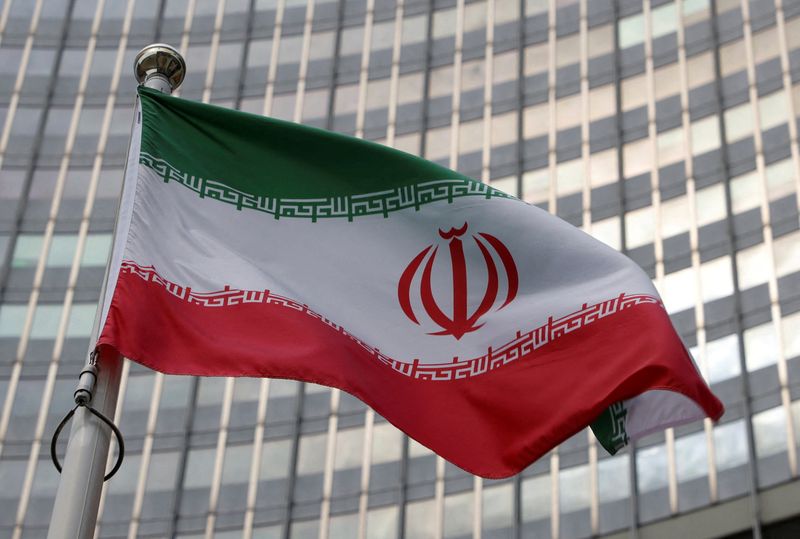US-Iran ties remain adversarial but door for nuclear diplomacy remains open, US says
2023.09.18 12:35

© Reuters. FILE PHOTO: The Iranian flag flutters in front of the International Atomic Energy Agency (IAEA) organisation’s headquarters in Vienna, Austria, June 5, 2023. REUTERS/Leonhard Foeger/File Photo
By Humeyra Pamuk, Arshad Mohammed and Steve Holland
NEW YORK (Reuters) – A detainee swap that secured the release of five Americans held in Iran on Monday does not change Washington’s adversarial relationship with Tehran, although the door remains open for diplomacy over the Islamic Republic’s nuclear program, a senior administration official said.
The United States and Iran, after months of Qatar-mediated talks, have struck a deal in which Tehran released five U.S. dual nationals who were imprisoned in Iran in exchange for five Iranians held in the United States.
Speaking to reporters late on Sunday, senior Biden administration officials said Washington would keep up the pressure on Tehran by imposing fresh sanctions on Iran’s ministry of intelligence and former President Mahmoud Ahmadinejad for their involvement in the detention of U.S. citizens. The U.S. had also increased its interdiction posture in the region to deter Iranian arms shipments into Yemen.
Even so, they said the door for diplomacy over Iran’s nuclear program was not entirely shut.
“If we see an opportunity, we will explore it but right now, I’ve really nothing to talk about,” the senior administration official said on condition of anonymity.
Asked if there would be any indirect talks with the Iranians this week in New York on the sidelines of the United Nations General Assembly, the official said: “You asked if there’s any talks planned this week, absolutely not.”
It was unclear if the official meant to deny any indirect talks, or if he was deliberately leaving the door open for them.
After taking office in January 2021, U.S. President Joe Biden tried to revive the 2015 Iran nuclear deal under which Iran had restricted its nuclear program in return for relief from U.S., European Union and U.N. sanctions.
Former U.S. President Donald Trump, a Republican, reneged on that deal in 2018, arguing it was too generous to Tehran, and restored broad U.S. economic sanctions against Iran.
Efforts to revive that deal appeared to die about a year ago, when diplomats say Iran rejected what EU mediators called their final offer. However, earlier this year Washington and Tehran began exploring what analysts describe as “understandings” – which Washington has never acknowledged – to lower tensions over nuclear and other issues.
Under Monday’s deal, $6 billion in Iranian funds previously held in a restricted account in South Korea had been moved to a restricted account in Qatar, where they would be available for “very limited” humanitarian transactions, the official said.
He listed these categories as food, medicine, medical devices and agricultural products.
“If Iran tries to divert the funds, or use them for anything other than the limited humanitarian purposes authorized, we’ll take action to lock up the funds,” the official said.
Under the agreement, five Iranians will receive clemency, the officials said. Two of the five had been in prison and their sentences were about to expire, while three others were awaiting trial and had not been convicted.
One of the officials anticipated that two of the Iranians who do not have legal status in the United States would return to Iran through Doha.








